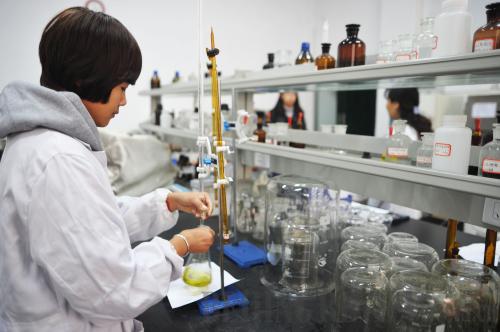 |
|
FOCUSING ON RESEARCH: An employee of Boying Science and Technology Co. Ltd. conducts an experiment in the lab on November 29 (WEI YAO) |
Boying is a perfect example of a company capitalizing on the country's emerging marine economy.
In his keynote speech to the 18th National Congress of the Communist Party of China in November, the then General Secretary Hu Jintao pledged that China would further exploit its marine resources, develop its marine economy and protect its marine environment.
Experts say the strategy gives the country's 3 million square km marine area unprecedented focus and raises the significance of the sea to the country's growth.
China's marine economy totaled 4.55 trillion yuan ($722.22 billion) in 2011. The country's marine output will reach 10 percent of the country's GDP by 2015, said Liu Cigui, Minister of the State Oceanic Administration.
Xiamen, in southeast China's Fujian Province, is a leading power in this new trend.
Built by the sea, the city is adjacent to a 390-square-km marine area and the output of its marine economy reached 28.44 billion yuan ($4.55 billion) in 2011, accounting for 11.2 percent of the city's GDP and up 15.2 percent year on year, according to a report from Xiamen Daily.
And the city is bent on further shoring up the sector to fuel its economy.
Right now, the city is mulling over a series of pro-growth policies for the sector and plans to earmark no less than 100 million yuan ($15.87 million) each year to subsidize development.
The South Marine Research Center is being built in Xiamen and 50 million yuan ($7.94 million) has been invested in its construction. The center will house high-caliber researchers in oceanography.
Talented professionals in the marine hi-tech sector are fundamental for Xiamen's competitiveness. The city is now compiling a list of universities that offer majors in marine studies. The government says that it plans to offer subsidies to companies who hire those with relevant expertise. Twenty percent of the pay for professionals in the field, as high as 300,000 yuan ($48,000) annually, will be subsidized by the government.
Boying is building a 50,000-square-meter industrial park in Xiamen, and will receive 50 million yuan in subsidies from the central and local governments. The company's taxes have also been halved from 18 percent to 9 percent.
The company's business revenues totaled more than 30 million yuan ($4.8 million) in 2012 and is estimated to grow to 100 million-200 million yuan ($15.87 million-31.74 million) in the next two years, said Li Bo, Assistant General Manager of Boying. "And we plan to be listed in the ChiNext, China's growth enterprise board, in 2014, to raise capital for the second-stage construction of our industrial park."
As a start-up business, Boying faces several hurdles.
"The biggest problem would be the lack of talented personnel. Since our company is located in the suburbs—a 40-minute drive from the downtown center—most people are unwilling to commute so far every day," said Li.
An additional problem is that desalinized seawater cannot be commercialized since it cannot be funneled into the current water supply system in cities. Furthermore, it's more expensive compared to traditional drinkable water.
The country doesn't have a large-scale and commercial use for desalinated seawater. There is a reason for that. Every city has its own water supply system, said Boying's chief engineer Chen. "The government needs to solve this problem and advocate the concept that desalinized seawater is good for your health. And the cost is higher than ordinary drinkable water, which makes it hard to commercialize."
Another headache is the less-than-perfect environment for the protection of intellectual property rights.
"As soon as our products come to the market, there will be imitation products. Defending our patents with relevant laws is costly and the laws have loopholes," said Li. "The only way to keep our competitiveness in this industry is relentless innovation."
Email us at: zhouxiaoyan@bjreview.com | 